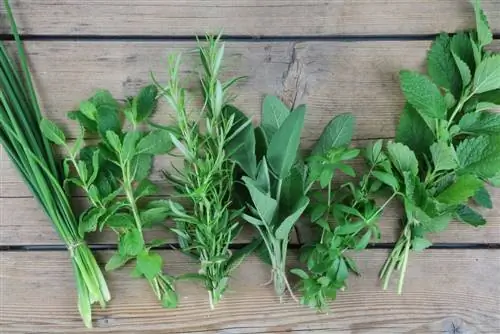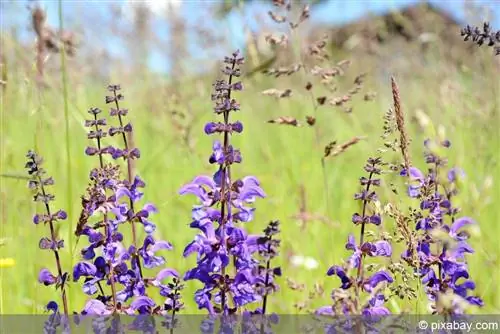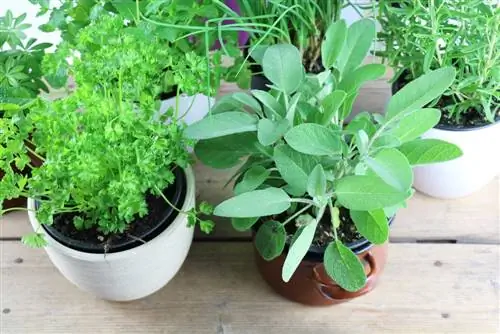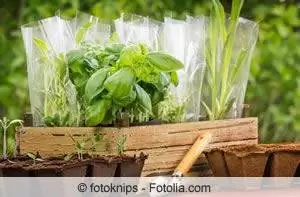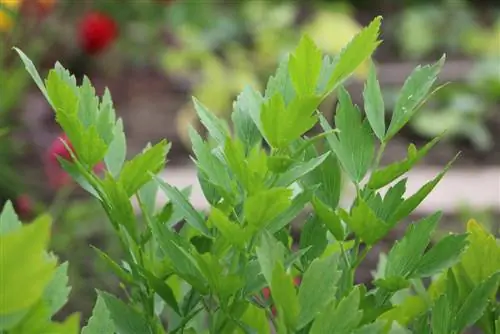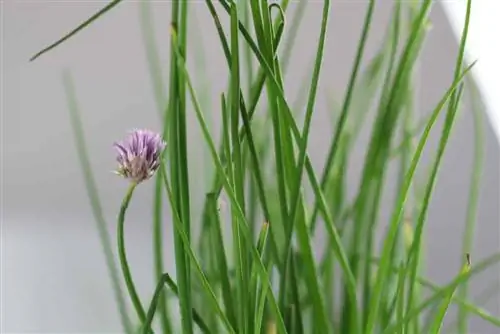- Author admin caroline@plants-knowledge.com.
- Public 2023-12-17 03:39.
- Last modified 2025-06-01 06:48.
The supermarkets also offer fresh herbs in pots. However, depending on the supermarket, this offer is limited to the usual herbs that every housewife has known for a long time. As cooking becomes more popular, interest in more rare and unknown ingredients also increases. This also includes herbs, which is why the range is becoming more and more diverse. If you really want to always use fresh herbs in the kitchen, you should grow them yourself on the balcony in boxes and pots or in the garden.
Which herbs are popular?
Fresh herbs are very popular when preparing food because they bring a spicy taste to the food. In addition, most herbs also have a specific effect on digestion, and others even have a specific he alth value. So it's actually not just the culinary herbs that are planted, but also some of the so-called medicinal herbs. These are the most popular because of their taste and effect:
- Rosemary, helpful for digestion, against cramps in the stomach, delicious with potatoes and meat
- Sage, Italian and Mediterranean, has an antibacterial effect, against bad breath, digestive problems, sore throats and inflamed gums
- Basil, also often found in Italian cuisine, has an antibacterial effect
- Dill, tastes delicious in cucumber salad, calms the stomach and helps with women's ailments
- Parsley, tastes great in salads, on potatoes, is diuretic and flushes out bacteria
- Chives, slightly spicy, lots of vitamins, tastes delicious in a green salad, purifies
- Cress, delicious with quark on bread, in salad, has rich trace elements such as chromium
- Tarragon, French classic, in sauces, stimulates digestion and metabolism
- Peppermint, known as tea, relieves cramps and nausea
- Thyme, helpful for coughs, but also for falling asleep
There are now many well-known and always new and unknown types of herbs. The common ones like those mentioned above can be purchased as seeds in bags at the supermarket or drugstore. Some of them are sown at certain times, others, like cress, at any time.
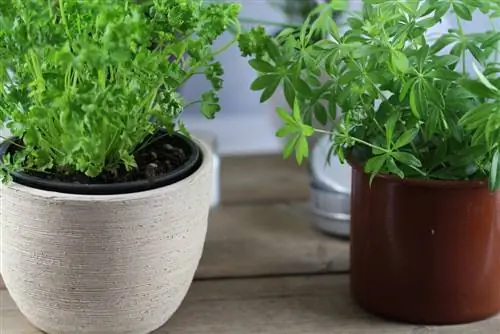
What should you pay attention to when sowing or planting? - Depending on whether you buy your herbs as seeds or as potted plants, you can plant them at any time of the year. The so-called containers - i.e. young plants in pots - can be planted in the garden in frost-free weather. If you don't have a garden, you can also choose a large flower pot or even a flower box. However, it would make sense to use normal garden soil and not potting soil. This is pre-fertilized and this fertilizer is probably not intended for edible plants.
Tip:
Herbs as seeds are inexpensive.
Herbs in the garden
A small herb bed in the garden offers the opportunity to use a wide variety of fresh herbs all year round. Culinary herbs are all the varieties that are commonly used in the preparation of food and how everyone knows them. In addition to parsley, chives and dill, you can actually grow a variety. Herbs are robust and only tolerate drought. If you create a raised bed or a herb spiral for them, they will find a place that is optimal for their circumstances if you know their preferences. It is best if the herb garden is planted near the terrace, then you can quickly cut something off without having to put on your gardening shoes.
Annual, biennial and perennial herbs
The herbs available in seed packets are mostly annual varieties that are best planted in May. Then there is no longer any fear of ground frost and the seeds can germinate unhindered. The exact sowing time can be found on the seed bag, as well as when the herbs are ready to be cut. If you want to sow biennial or perennial herbs, September is best used. Alternatively, you can also plant young plants in the garden on site in spring.
Tip:
Do not treat herbs with chemical fertilizers, this can affect the taste.
As with all plants in the garden, the herbs should not be watered in the midday sun, otherwise they could easily burn. Early morning is just right; alternatively, or in very hot summers, you can water again in the evening when the sun is no longer shining.
Tip:
Only parsley, chives or caraway need a lot of water, the others require less.
It also makes sense to always keep the soil around the herbs nice and loose so that enough air can reach the roots. In addition, the irrigation water can penetrate better.
Herbs as young plants in pots
If you don't want to wait until the seeds have developed into small plants, which then take a while until they are ready to harvest, you can also use so-called container plants. These are available at gardening stores, where you can buy them in many varieties. In this form, you can quickly create entire herb beds such as a herb spiral or a raised herb bed, as you can immediately see how many plants there are space for. This type of use also saves too many plants.
Tip:
Cutting back herbs promotes new growth.
If culinary herbs develop well, you can harvest regularly and abundantly. Now it's even worth freezing the herbs or hanging them up to dry, as you can do very well with rosemary twigs. Parsley, chives and dill can be frozen as salad mixes and conjure up a particularly tasty green salad in the middle of winter
Planting medicinal herbs in the garden
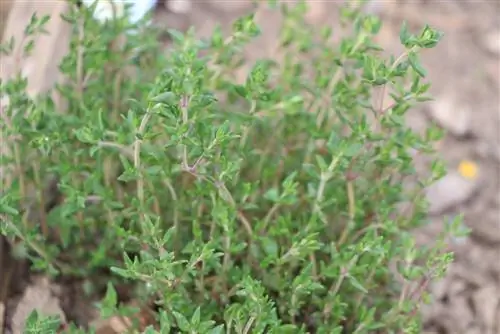
Not only culinary herbs, but also medicinal herbs can be planted in the garden. With their healing ingredients, they provide relief from many ailments. You can use it as a tea (peppermint) or make an ointment (calendula, chamomile). That's not a lot of effort.
Some herbs are also planted to support other flowers and plants. When planted between roses, lavender not only looks pretty, but also drives away many pests. Peppermint looks great and the fresh green leaves decorate the flower bed. The gardener can snack every now and then while working in the garden. The sunnier the flower bed, the more the herbs exude their aromatic scent. This is very clearly noticeable with the thyme when it creates joy in the rock garden between the upholstered perennials.
What you should know about growing herbs in brief
Plants specially planted in the herb garden not only benefit us, but also nature in a special way. For us, they offer a lot of variety in the kitchen and, above all, a lot of aroma, vitamins and the feeling of eating and living he althily, which is also justified. Nature benefits in several ways: On the one hand, many herbal plants are a source of food for many insects, which feed mainly on pollen, and on the other hand, many plants such as nasturtiums and marigolds drive away lice. They are also easy to care for and dead plant remains provide shelter for small creatures in winter.
Herb bed, mixed bed or herb spiral?
- In the herb bed you have everything you need in one place. A bed close to the kitchen is ideal. A pure herb bed doesn't require as much space as the other two options. The disadvantage is that different plants often prefer different soils and also differ in terms of care.
- A mixed bed, especially with vegetables, is beneficial because the plants protect each other. Onions and chives next to carrots repel the notorious vegetable flies. Garlic or onions next to strawberries protect against fungal diseases. Thyme as a bed border keeps snails away. This list can be continued indefinitely. Herbs also benefit each other. The mixed bed obviously requires more space.
- A herb spiral looks good and offers different conditions in a small space that suit the plants. The herbs that like it dry grow at the top and those that need it moist grow at the bottom. There is plenty of space in the middle for those with normal needs. You can even put a water basin at the end. Watercress, water mint and fever clover still thrive in the water zone. The disadvantage is that the spiral is the most complex variant to set up.
Balcony or potted garden?
If you don't have a garden, but "just" a terrace or balcony, you don't have to go without fresh herbs. Herbs can be cultivated quite well in balcony boxes and planters. Sufficient sun is important. Almost all common herbs thrive in boxes or pots. Herbs look particularly beautiful in terracotta vessels, somehow Mediterranean. But stone and wooden vessels are also suitable.
Conclusion
Nobody has to go without fresh, home-grown herbs. Many even grow on the window frame, at least throughout the summer. Care is often not difficult, so cultivation is worthwhile.

